How Kenya is running the sport
When it comes to the international sports arena, it is no doubt that Kenya is one of the countries that has dominated middle- and long-distance running. Since the 1960s, Kenyan athletes have dominated long-distance running events in both the male and female categories. In the Boston Marathon for example, since 1990, 23 of the 32 first-place men in the Boston Marathon and 15 of the 32 first-place women have been Kenyan (Boston Marathon).
Take a look at the worldwide rankings below from World Athletics, based on the athletes’ average score over a certain number of competitions in a defined period of time.
| Category | Kenyans in the top 100 (Male) | Kenyans in the top 10 (Female) |
| 10,000m | 43 | 22 |
| Road Running Half Marathon-10km | 57 | 43 |
| Marathon | 48 | 31 |
Kenyan long distance runners, who hail primarily from the Rift Valley region, are such a phenomenon that Iten, a town in Rift Valley region where most of these athletes train and reside, has been unofficially dubbed the “mecca for elite long distance runners”(Mukhtar 2019). World Athletics awarded Iten town a Heritage Plaque In 2020 as a recognition for its contribution in the advancement of athletics in the world (AfricaNews 2022). Today, marathoners from all over the world go to Iten, the country’s unofficial running capital, to train before major races.
So…who is Eliud Kipchoge?
One of the elite long distance runners who recently smashed his own marathon record of 2:02:40 at the September 2022 Berlin Marathon with a new time of 2:01:09 is Eliud Kipchoge. With many gold medals under his belt, Eliud Kipchoge is considered a trendsetter in the running world and a great marathoner. Kipchoge is a running legend, and not just in Kenya, his home country.
Eliud Kipchoge has garnered worldwide recognition and fame over the course of his athletic career and has become an influential, famous, public figure. On Instagram, Kipchoge has over 2 Million followers and videos about him on YouTube garner hundreds of thousands of views. Kipchoge was also the first athlete in Kenya to be awarded the Elder of the Golden Heart (EGH) in 2019 by the incumbent President, Uhuru Kenyatta, for “inspiring the world” through his INEOS 1:59 challenge dubbed No Human is Limited, where he became the first person to run a marathon in under two hours (Citizen TV Kenya 2019). For this same challenge, Eliud Kipchoge was named BBC’s World Sport Star of the Year in 2019 (BBC Sport).
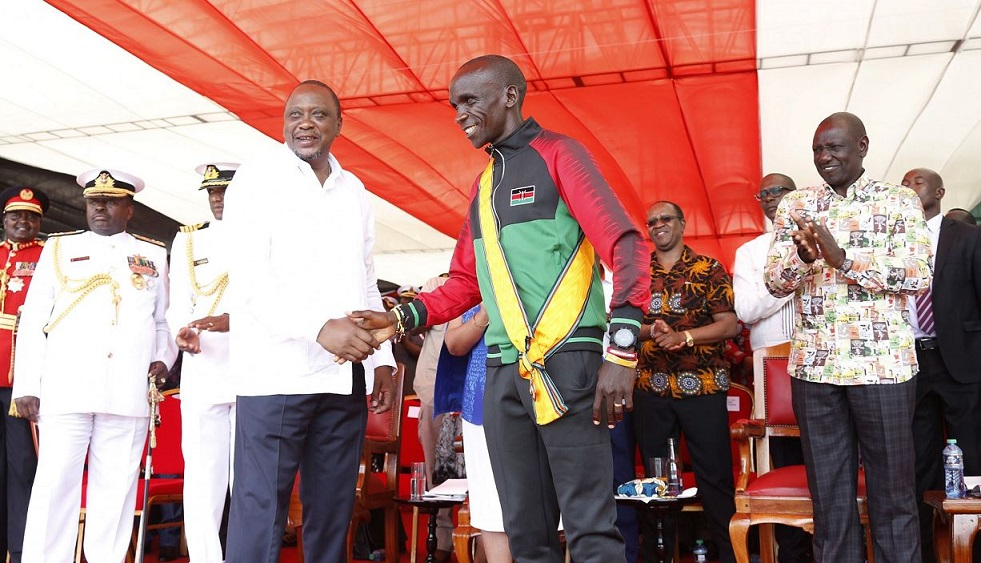
Clearly, Eliud Kipchoge’s influence has transcended the running world and he has become a role model and inspiration to many. When receiving the Laureus Academy’s Exceptional Achievement award in 2019, Kipchoge acknowledged the reach of his influence:
I would like to thank my fans around the world for all their support… It means that I have been making a big impact in this world – to be recognised for exceptional achievement not just in athletics, but in the whole category of sport.
Eliud Kipchoge
Put differently, Eliud Kipchoge has effectively emerged as a leader. In this project, I intend to examine Kipchoge’s INEOS 1:59 Challenge and analyze how Kipchoge’s approach to and completion of the marathon correspond to various leadership theories, effectively turning him into a leader.
Therefore, my main question is:
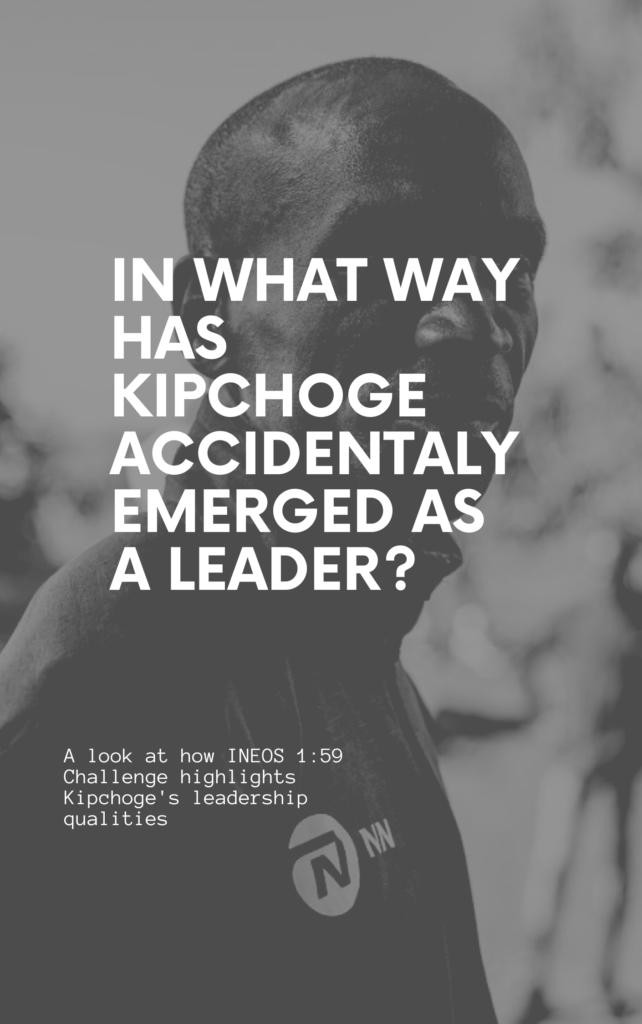
INEOS 1:59 Challenge
The INEOS 1:59 Challenge, advertised with the slogan “No Human is Limited” was a successful attempt by Eliud Kipchoge to run a marathon in under 2 hours on October 12th 2019 in Vienna, Austria. Although the 1:59 Challenge was not considered an official world record due to the fact that standard competition rules were not followed, Kipchoge became a world sensation after completing the marathon with a time of 01:59:40.2 (Olympics).
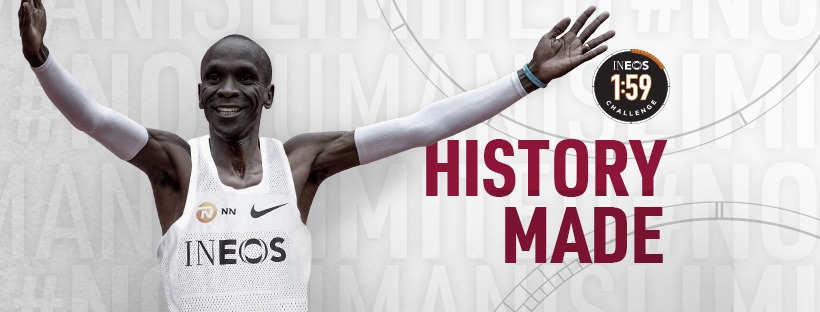
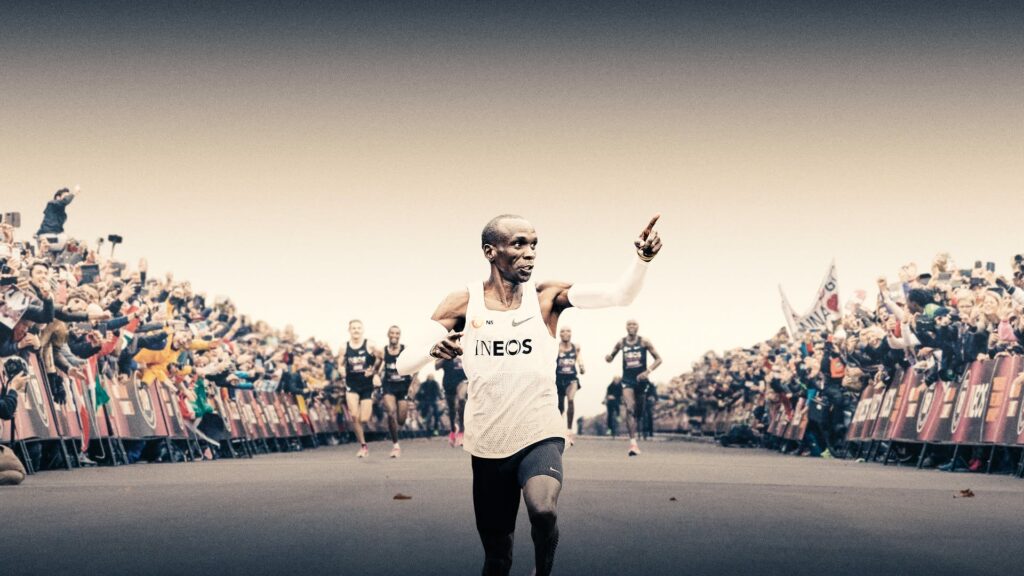
I will model my analysis of Kipchoge’s progress and completion of the 1:59 challenge on the following two leadership theories:
- Trait Theory
- Transformational Leadership Theory
But first, who is a leader?
An idea held for a long time is the idea of leadership as a one-way process; the leader leads, the leader decides, the leader implements. What I have learnt is to look at leadership as an influence process, “an interactive event that occurs between the leader and the followers” (Northouse, 2020:7). One must also resist the urge to regard leadership as synonymous to title, management and duty because none of them guarantee leadership. People in positions of authority can squander the power of their titles and effectively not be leaders, a situation that Michael Sorell terms as “small l” leadership as opposed to “big L” leadership which would be actual leadership (Michael Sorrell 2020, pt. 8:12). As a classmate perfectly summarized, “lead” is a verb and consequently, leadership is an action, not a status. Kipchoge, therefore, is not a leader simply by being famous.
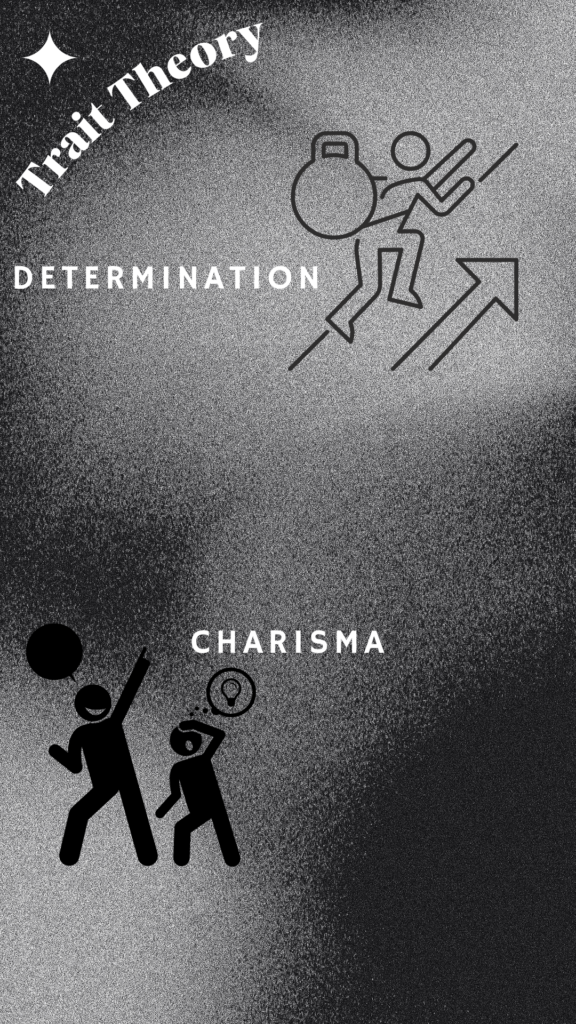
Trait Theory
2 of the 6 traits
The 2 theories of leadership
Case: INEOS 1:59

In his book Introduction to Leadership, Northouse identifies 6 key traits unique to successful leaders (Peter G. Northouse 2021, 27):
- intelligence
- confidence
- charisma
- determination
- sociability
- integrity
For Kipchoge, determination stands out as a prominent trait that informs his participation in the INEOS 1:59 challenge. Determined leaders do not just “get the job done,” they are proactive in setting out the task ahead, knowing what will be required of them, and they “have the capacity to persevere in the face of obstacles” (2021, 29). Kipchoge’s decision to break the two-hour marathon bar in Vienna through his No Human is Limited is a powerful example of determination. He trained and prepared for this challenge so that he could build the capacity to effectively achieve his goal. Barnabas Korir, an executive board member of the governing body for track and field sports in Kenya, commented too that Kipchoge “is one of the few athletes who is completely determined” (Diallo 2022, para. 8). All this attests to a “strength of will” that Sigmund Freud considered significant in making a great man and, effectively, a leader (Freud 1986, 115).
Because leadership is understood as a process in which leader and followers influence each other, it is important to see why masses “follow” Kipchoge based on these traits. Charisma, often attributed to one’s eloquence, charm and appeal, can hugely affect followership. As pertains to the characteristics of charismatic leaders outlined by Northouse, the following correspond to Kipchoge (Peter G. Northouse 2021, 28–29):
- They serve as strong role models for the values that they desire others to adopt.
- They articulate clear goals and strong values.
- They are an inspiration to others. They can excite and motivate others to become involved in real change.
Northouse discusses how Oprah Winfrey, by dint of having “been in the struggle” and survived, is exalted as a role model and leader (Northouse 2021, 37). Like Oprah Winfrey, Eliud Kipchoge has had to overcome many obstacles to get to where he is. Karanja Njoroge, a board member of a conservation group in Kenya, noted of Kipchoge’s Sep 2022 record that it is an “inspiration” (Diallo 2022, para. 5). Barnabas Korir concurred, adding that Kipchoge has inspired many youth and particularly many athletes from Kenya (2022, para. 8). Kipchoge himself, in fact, said in an interview that the INEOES 1:59 challenge “was about inspiring people more than breaking a barrier” (Chanda 2020).
From a Freudian perspective, Kipchoge has developed a very huge following because he is an “exponent or representative of mass tendencies which must come to expression and which found that expression as it were by chance in such persons.” Additionally, many people have “a strong need for authority which they can admire, to which they can submit” (Freud cited in Kellerman 1986, 113). The Freudian argument comes to the forefront when looking at role models and leadership particularly because role models, like leaders, “can inspire enhanced performance” (Hoyt, Burnette, and Innella 2012, 258). Korir, for one, sees Kipchoge’s Berlin record of 2:01:09 as an opportunity for Athletics Kenya to use it as “a symbol that [the Kenyan athletes] can do well if they remain focused, if they work hard” (Diallo 2022). Part of Kipchoge’s appeal is consistency as well, having proven that even with success and fame, he remains humble.
Eliud … fundamentally believes that however much you earn, whatever you have achieved, you must remain humble and that is certainly not easy. I have seen athletes who have had some success in their careers and who have been influenced in a negative way by the money they have earned as a product of that success. But not Eliud. Eliud hasn’t changed.
Augustine Choge, a friend of Kipchoge and was a pacemaker for the 1:59 challenge
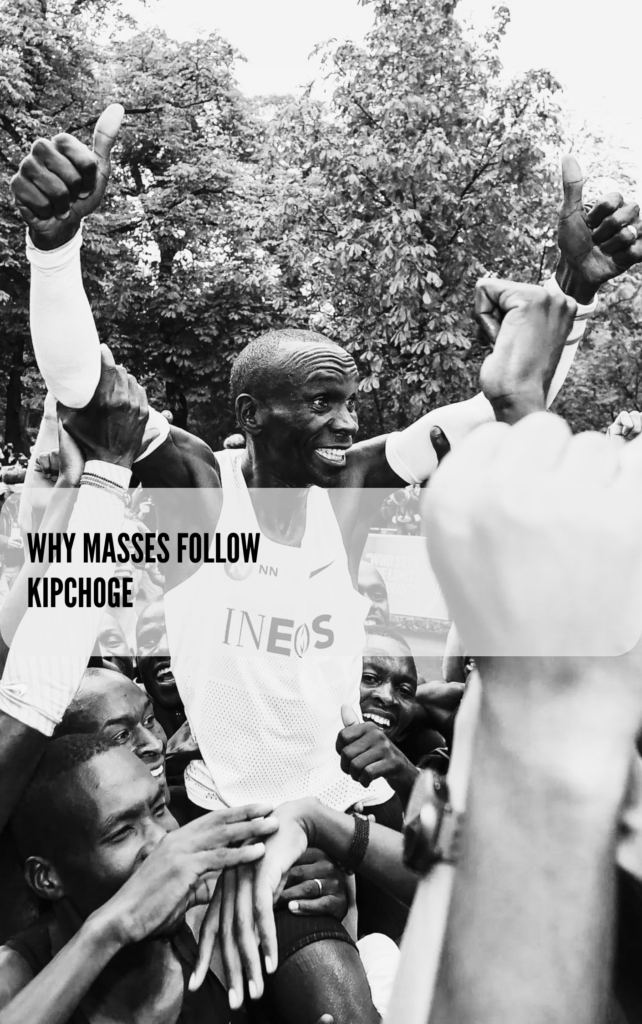
However, although determination and charisma emerge as prominent traits in Kipchoge’s athletic career, the trait theory does not stand out as the sole theory to explain Kipchoge’s emergence as a leader.
The second theory in explaining Kipchoge’s emergence as a leader is:
Transformational Leadership Theory
Transformational leadership theory is defined as intrinsically aligning “to a greater good … and a course that will yield [a] certain superior social dividend” and transformational leaders are “visionary leaders who seek to appeal to their followers’ better nature and move them toward higher and more universal needs and purposes” (Khan, Irfan Ullah Khan, and Allah Nawaz 2016, 3). No better quote paints Kipchoge, then, as a transformative leader more than this:
The reason to run 1:59 is to tell that farmer that he is not limited; that teacher that she can produce good results in school
Eliud Kipchoge
It must be noted that transformational leaders have also been described as ‘visionary’, which underlines the importance of vision when analysing leadership. In developing a vision, a leader “is able to visualize positive outcomes in the future and communicate these to others” (Northouse 2021, 161). One of the key elements of transformational leadership described by Doris Goodwin when evaluating Lincoln’s Leadership style is setting an example (Doris Kearns Goodwin 2018, 131), and Kipchoge was doing just that; pursuing a never-done-before goal first so that others could follow with their own personal goals. In taking on the challenge to run the 1:59 Marathon, Kipchoge was inspiring a mindset wherein people, especially people who thought themselves ordinary and powerless, believed in their own potential to achieve great things. In effect, Kipchoge was hoping to ‘move them towards higher purposes’. Goodwin also mentions “keep your word” as a defining characteristic of transformational leadership. Although it may seem obvious, Kipchoge planning to run the marathon race and then running the marathon is fundamental to building his credibility as someone who can keep his word.
When we pair these two theories together, Eliud Kipchoge emerges as a leader.
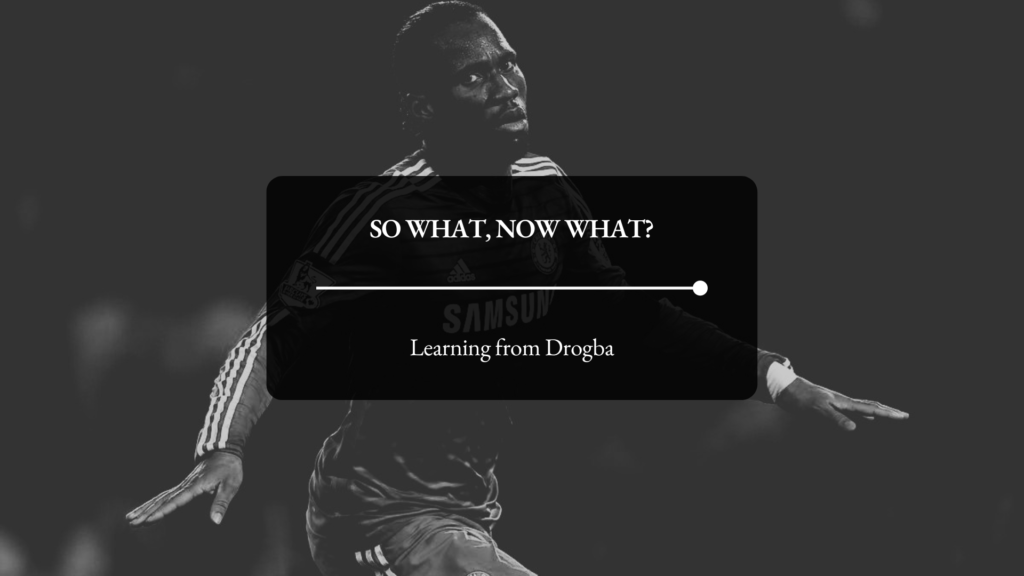
In this day and age, popularity and influencing has shifted with increased use of media and dissemination of news and information through media and the internet. In the field of sportsmanship, popularity in the media has accorded famous athletes the opportunity to effect change and effectively be leaders – a situation I term as accidental leadership. Didier Drogba, a popular Ivorian footballer who was inducted into the Premier League Hall of Fame as a “Chelsea Legend” in April 2022 (Emms 2022, para. 1), exemplifies this leadership potential by merging his vision with his situation of accidental leadership. Drogba, in an acceptance speech to be the Vice President of Peace and Sports, explained this idea of making positive use of his unintended leadership.
“My 25-year career has given me a certain amount of fame and I’ve built up a network. I now want to use my voice to bring positive change in the world” (Drogba 2018).
After Côte d’Ivoire’s football team qualified for the World Cup against Sudan in 2005, Didier Drogba addressed fellow Ivorians in a television broadcast from the team’s locker room on the ongoing civil war, begging the rebels and the government forces to lay down their arms and organize elections , pointing out that the national football team, if anything, examplified the unity they all shared in being Ivorian (Arturo Rebolledo 2016)(Kobo 2022)(Grez 2017, para. 1)(Nagarajan 2021)(Momodu 2018, para. 5).
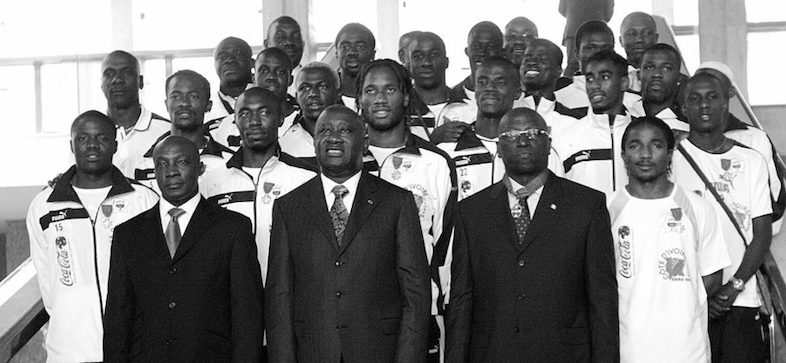
In April 2007, Didier Drogba oversaw the signing of a peace agreement between the government of Côte d’Ivoire and rebel forces (2018, para. 5) (Didier Drogba Foundation).
Photo: Cote D’Ivoire President Laurent Gbagbo poses for a picture with the 2006 World Cup football team in Abidjan
Credit: Kampbell/AFP via Getty Images
In 2007, Drogba went on to found the Didier Drogba Foundation that has worked mainly in healthcare and education in Côte d’Ivoire by building schools, donating to NGOs, and acquiring a mobile clinic to provide quality healthcare to remote populations (Didier Drogba Foundation, 2015). Drogba spoke of his mission:
I dream about a happy and healthy Africa, a more educated one, setting out to conquer the world. An Africa we will be proud to leave to our generation. An Africa whose stars will no longer be just footballers or singers, but scientists, doctors, brilliant economists, innovative entrepreneurs, social entrepreneurs, committed leaders!
Didier Drogba
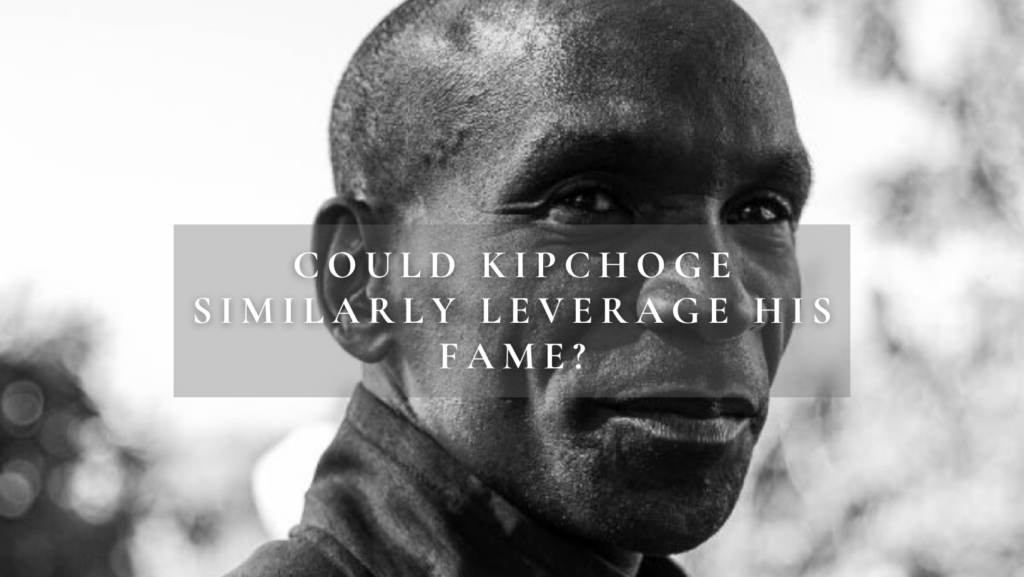
As a highly influential public figure in Kenya, Kipchoge has the potential to use his platform and influence to make positive changes in the country. So far, Kipchoge has used his influence to advocate for issues that are important to him by launching the Eliud Kipchoge Foundation, committed to promoting education and environment conservation within Kenya. Kipchoge is leveraging his fame and influence currently to fund this organization.
From my own experience, I saw that most athletes dropped out of school and tried to build a life without education. But with education, it can help you grow and it can help you grow your community alongside you. My dream is for all schools and kindergartens in the world have good libraries. From a very young age, children need to get in contact with books, with learning. This builds a good foundation for children. The library is the place to get information.
As a farmer myself, I know about the importance of a good environment, of trees, of using the land in a sustainable way, so people can grow healthy food and plants, also for the next generations. I believe together we can make dry land green again, which has a huge impact on biodiversity, water availability and healthy food.
Eliud Kipchoge
Kipchoge, in coming years, could also vie for the gubernatorial seat for Elgeyo-Marakwet County, where Iten is located. With his plans to promote education and environment conservation, more systematic change would be possible through the county government. All in all, Kipchoge is uniquely positioned to effect change as a leader.
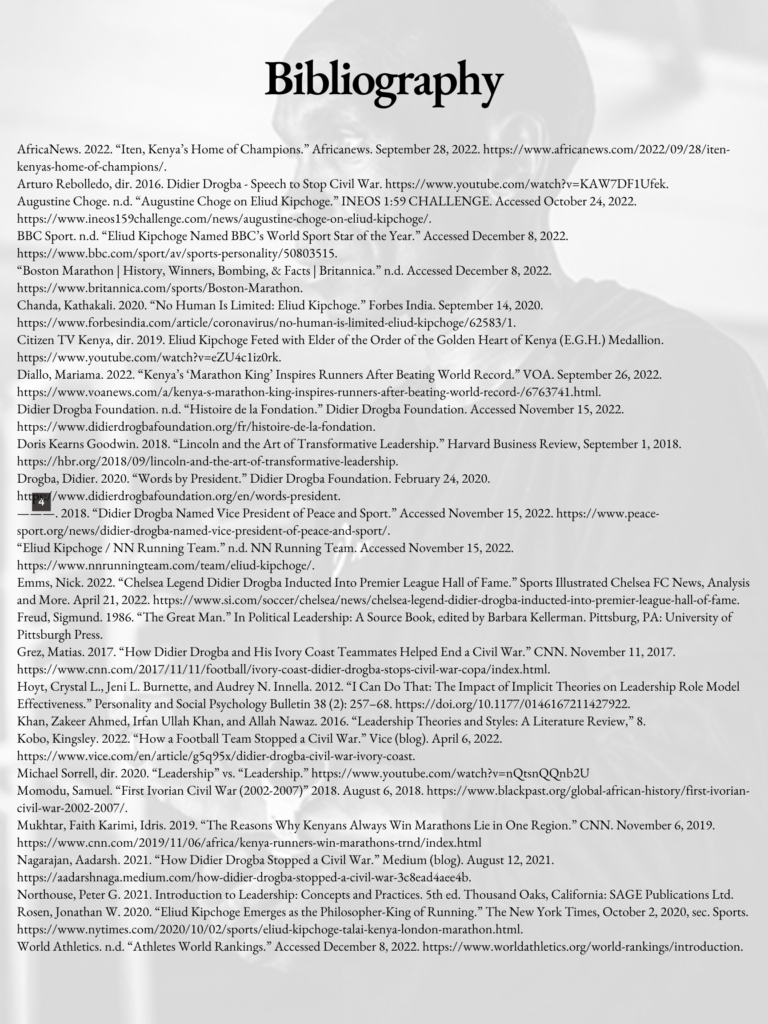
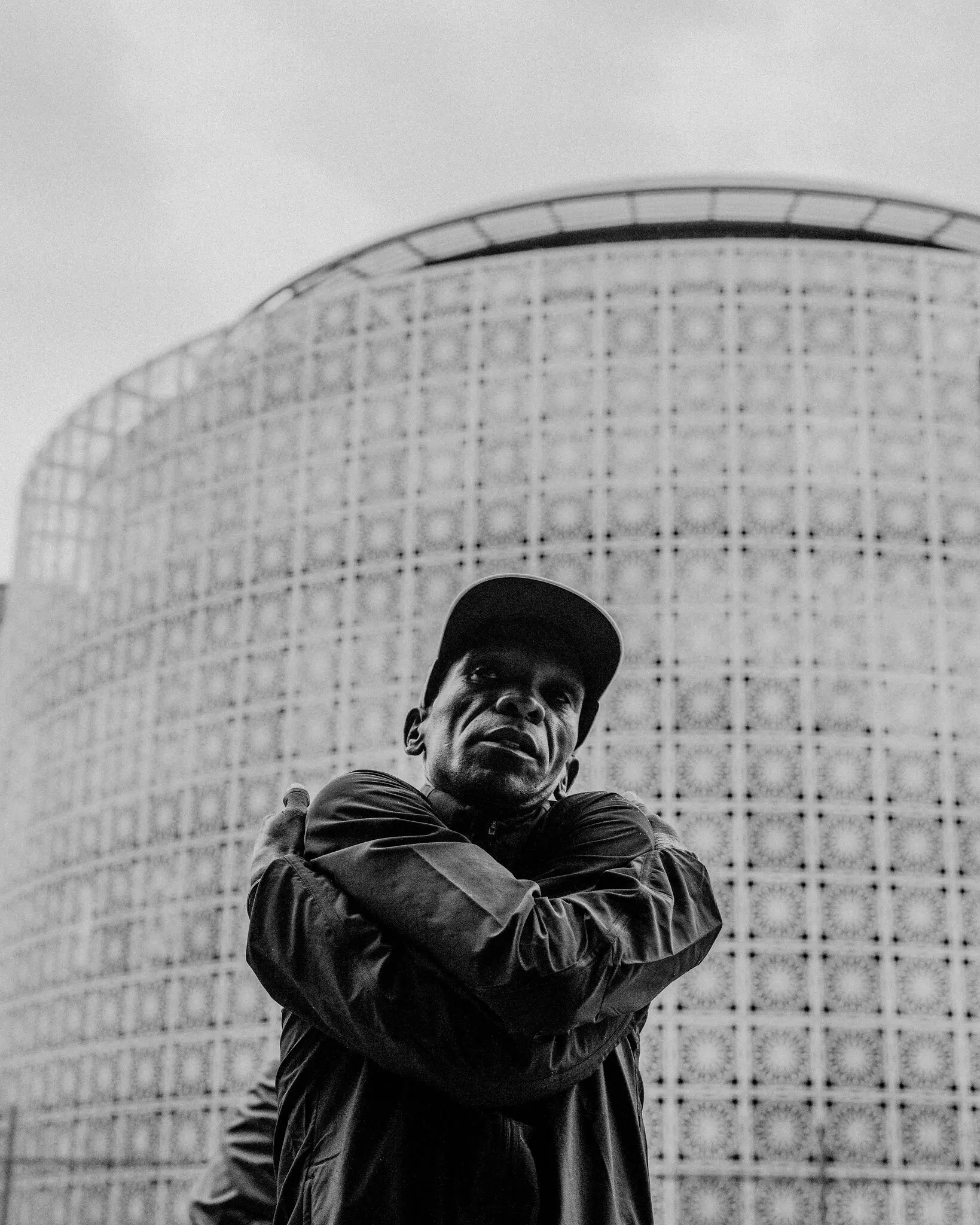
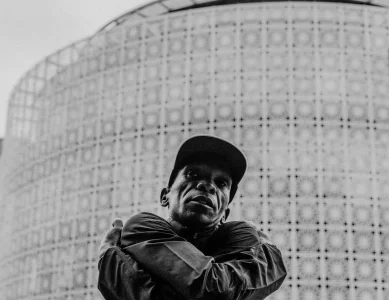
Patrick, as the former director of SE programs at Middlebury, I happen to know that you are a SE Fellow (post my tenure), and I am delighted to see that this seminar project highlights the connections between leadership, a concern for the greater good and, of course, the resources required to leave the world a better place than one found it. I am also thrilled that this project highlights Africa’s potentials in terms of a new type of leaders and influencers. Twendeni!